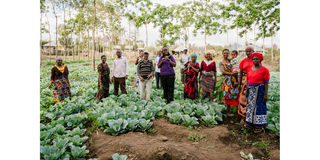Farmers co-operatives rewrite the story of poor harvest

What you need to know:
- Across the country, farmers are now actively managing agricultural risks through organised co-operatives rewriting the narrative of food insecurity
Dar es Salaam. For years, rural Tanzania has been trapped in a familiar cycle—unpredictable rains, pest outbreaks, and livestock diseases, all leading to poor harvests and deepening hardship. But this year’s Nane Nane fair told a different story: one of transformation, resilience, and collective action.
Across the country, farmers are now actively managing agricultural risks through organized co-operatives rewriting the narrative of food insecurity.
The shift began in early 2023, when Moshi Co-operative University teamed up with Swedish development agency We Effect to train 90 managers from producer groups and civil society organizations. The training focused on planning, governance, and entrepreneurship skills now reshaping how farming is done across regions.
“Farmers are moving from praying for rain to preparing for shocks,” says Programme Director, Prof Baltazar Namwata. “The biggest change is in mindset. When smallholders negotiate with processors, banks, or land officers, they lift the floor for everyone.”
New systems, real results
Despite ongoing challenges like erratic weather and limited access to finance, co-operatives are embracing practical solutions. Many are pushing for warehouse receipt systems that allow farmers to store crops and borrow against them. Meanwhile, national discussions around crop insurance and irrigation support are gaining ground.
In Kilimanjaro, the Dairy Co-operatives Joint Enterprise now sells milk directly to processors, nearly doubling farmers’ incomes. “Daily yields are rising as villagers adopt new feeding techniques,” Prof Namwata says.
The co-operative has also introduced tighter bookkeeping, access to credit, and female-led oversight to boost transparency. A pilot on weather-index insurance is underway to shield farmers from drought-related losses.
In Dodoma, the Mpunguzi Grape Farmers Co-operative (UWAZAMAM) has doubled its yields—from 3.5 to 7 tonnes per acre—by improving pruning and pest control. Membership has grown to 400, half of them women. The group is now exploring value addition through wine production.
“Selling grapes earns money, but owning the bottle captures full value,” says Prof. Namwata.
Youth and women take the lead
Elsewhere, young farmers are innovating. The Tanzania Youth Coalition (TYC), through its Boresha Maisha ya Vijana project, is helping over 200 youth shift from bulk selling to branded products like peanut butter, honey, and wine. At its agribusiness academy, 80 trainees have already gained skills in food safety and pricing strategies.
However, experts warn that none of this progress is sustainable without secure land ownership. Lawyer Innocent Cyprian from the Tanzania Land Alliance (TALA) notes that many widows and daughters still lack title deeds.
“A title deed is the first climate adaptation tool,” he says. TALA’s paralegals now support families in registering joint ownership to protect land investments.
According to We Effect’s Country Coordinator, Frank Ademba, the Livelihood and Right to Food programme now reaches 120,000 farmers across seven regions 60 percent of them women. At last year’s Nane Nane fair alone, participants recorded Sh28 million in sales, a clear sign of gains achieved through knowledge and negotiation, not chance.
He said the villages of Kilimanjaro, Dodoma, Mwanza, and Iringa, ledger books are filling up not with promises, but with litres, kilos, and shillings. In those numbers lies a new future: rural families learning to plan, price risk, and fight hunger with both seed and strategy.





